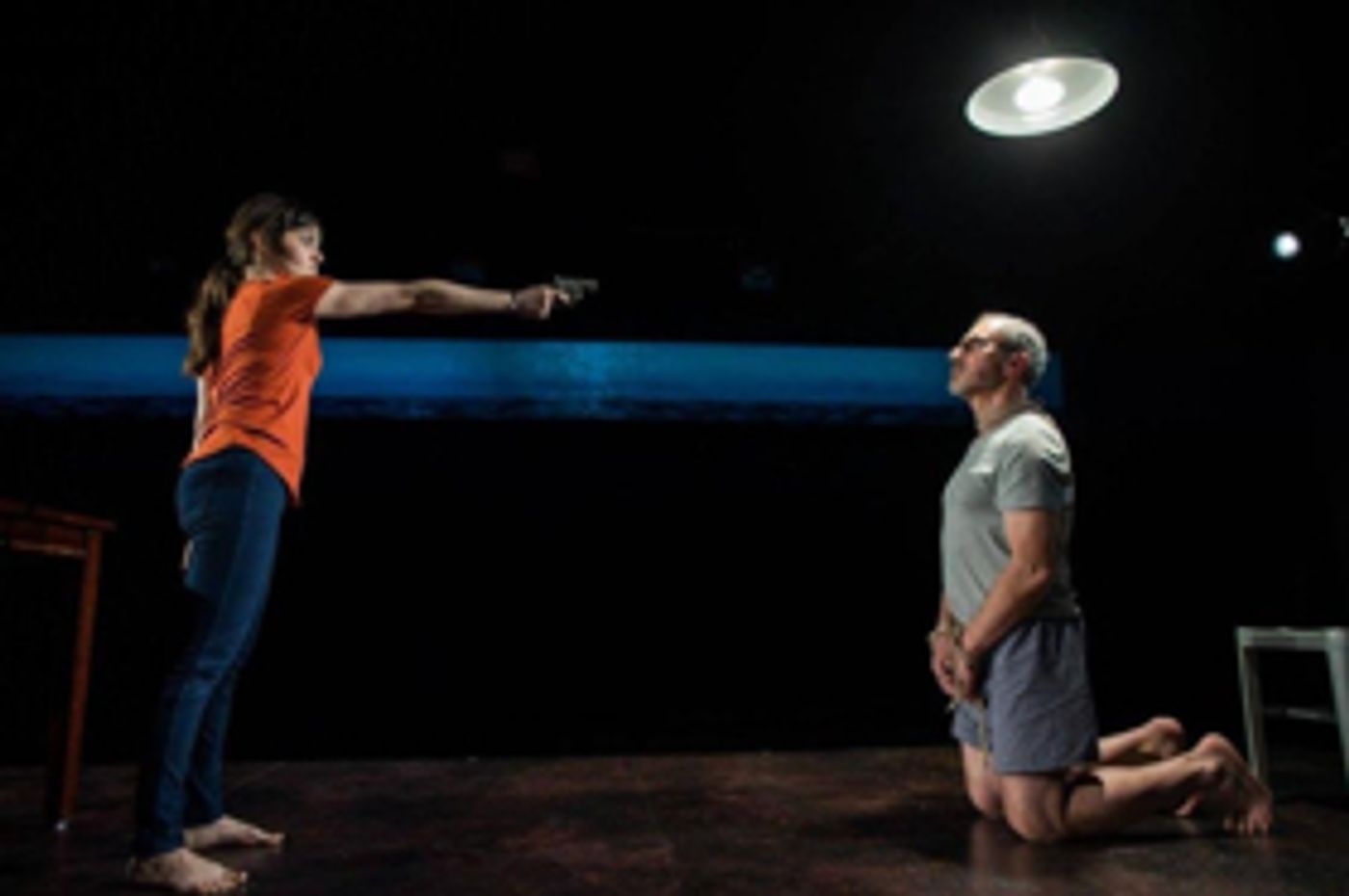Review: DEATH AND THE MAIDEN: A Play for the Zeitgeist

Death and the Maiden
Written by Ariel Dorfman, Directed by Steven Maler; Clint Ramos, Scenic and Costume Designer; Jeff Adelberg, Lighting Designer; Arshan Gailus, Sound Designer; Sally Tomasetti, Properties Designer; Jenna Worden, Stage Manager; Rachel Coming, Assistant Stage Manager; Nikta Sabouri, Assistant Director; Kristen Mazzocchi, Production Manager; Nile Hawver, Fight Consultant; Stephanie Klapper, Casting
CAST (in alphabetical order): Flora Diaz, Mickey Solis, Mark Torres
Performances through February 11 by Commonwealth Shakespeare Company in residence at Babson College, Sorenson Center for the Arts, 231 Forest Street, Wellesley, MA; Box Office 781-239-5880 or www.commshakes.org
Commonwealth Shakespeare Company goes beyond the Bard to fulfill its mission to "present plays of the highest artistic caliber that celebrate ideas and language to create dialogue around compelling issues of our time." Chilean author Ariel Dorfman's 1990 play Death and the Maiden is set in an unnamed country that is probably Chile as it emerges from a long period of dictatorship and adjusts to life under a fledgling democratic government. Even as the nation struggles to reinvent itself, one woman's road to recovery from captivity and torture is strewn with psychological obstacles that threaten her husband's career, their marriage, and her very sanity.
Under the taut direction of CSC Artistic Director Steven Maler, a trio of actors inhabits the cast of characters who spend 36 hours together in a secluded beach house, drinking a bitter cocktail of accusations, revenge, and redemption, with a twist of salvation. Flora Diaz (Paulina Salas) is riveting as the former political prisoner convinced that Roberto Miranda (Mark Torres), the good samaritan who stopped to help her husband Gerardo Escobar (Mickey Solis), stranded with a flat tire, is the demonic doctor responsible for her torture 15 years earlier. Although she had been blindfolded during her kidnapping, Paulina asserts that the stranger's voice is unmistakably that of her captor, and is determined to put him on trial with Gerardo's assistance. In portraying her character's single-mindedness, Diaz runs a gamut of emotions, alternately drawing the audience's skepticism or sympathy and support. There is no doubt that she has been oppressed and severely damaged, but it is more difficult to judge if the accused is the guilty party.
Dorfman seems to lay out a straightforward thesis that Miranda is the torturer, but introduces ambiguity when Gerardo, wearing his attorney's hat, delves into the evidence. Despite his vehement insistence of his innocence, Miranda understands that Paulina will only release him if he confesses to the crime. In order to understand the accusation fully, Gerardo implores his wife to state on the record exactly what transpired during her captivity. He then coaches Miranda so that he can give Paulina the detailed confession she requires. At times, it appears that Gerardo believes in Miranda's innocence and wants to win his release by appeasing his wife; at other times, he gives in to the possibility of the prisoner's guilt and unleashes his rage. Solis convincingly plays his character's duality, causing us to question exactly where Gerardo stands. The one thing that seems certain is that he views the situation through an egocentric lens, always bringing it back to what it means for him, especially vis-a-vis his recent appointment to the president's commission to investigate the crimes of the dictatorship.
Torres steadfastly maintains Miranda's stance of innocence and denial, providing a full-throated portrayal of a desperate and angry man, certainly unaccustomed to the intolerable treatment he is receiving at the hands of a woman he brands as "absolutely insane." Prior to being taken captive, he is affable and apparently politically like-minded with Gerardo. Once he is bound and gagged, Torres physically expresses his fear and confusion, wordlessly begging to be understood and untethered. When he is given the opportunity to speak, he is antagonistic and threatening, never giving the appearance of apologizing, even when finally writing his confession. Whether or not you believe Miranda's story, Torres infuses him with pride and arrogance that does not elicit sympathy.
Death and the Maiden is staged in the Sorenson Center's intimate blackbox theater on a rectangular, raised platform in-between two parallel seating sections. Not only are the actors slightly more than arm's length away, but one side of the audience faces the other, reflecting our own reactions as the trial unfolds. Paradoxically, the soothing, hypnotic sounds of the ocean can be heard in the background, while the discomfiting investigation of the violence and emotional abuses of the past plays out starkly under the penetrating glare of a spotlight and the threat of a death warrant. The design team (Clint Ramos, scenic/costume; Jeff Adelberg, lighting; Arshan Gailus, sound; Sally Tomasetti, properties) keeps it simple, yet effectively communicates that our focus should be on the language that Dorfman uses to tell this devastating story and the impact it has on each of the characters' lives.
There are so many elements woven into Death and the Maiden that give the play relevance nearly three decades after its first appearance. Leapfrogging to the fore in the zeitgeist of #MeToo is the way in which Paulina chooses to take back power and control of her life, to turn the tables on her oppressor, yet still face the struggle to be heard and believed by her own husband. Each of us in the audience is challenged to choose sides and then to examine the basis for the choice we make. While that inner debate takes place, the broader battle for the political soul of the country is being waged outside the confines of the theater. Are we to be sucked into the blackness of an authoritarian regime, or will we stand up for truth and justice by continuing to tell the stories of the Paulinas of the world?
Photo credit: Nile Hawver/Nile Scott Shots (Flora Diaz, Mark Torres)
Reader Reviews
Videos

